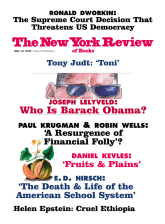In response to:
Silent Quantum Genius from the February 25, 2010 issue
To the Editors:
How utterly refreshing to read Freeman Dyson’s review of Graham Farmelo’s biography of Paul Dirac [“Silent Quantum Genius,” NYR, February 25], in which he also explores some of the author’s questionable diagnostic assumptions with regard to Dirac’s autism or Asperger’s syndrome. He speaks from the vantage point of his personal and professional acquaintance, and can refute, credibly to my view, that it just wasn’t so. In fact, he cites Dirac’s close friendships to Peter Kapitza, Niels Bohr, and Werner Heisenberg and loyalty to these friends, as well as loving family ties as evidence. In so doing, Dyson himself becomes credibly honorable since he stays clear of participating in a certain kind of facile, if interesting, deconstruction of character.
I particularly appreciate Dyson’s detailed rendering of Dirac’s assessment of Heisenberg, my father, to whom he remained a friend, when for other physicists this wasn’t a particularly plausible stance. Dirac understood Soviet dictatorship from personal experience sufficiently to put it point blank: “It is easy to be a hero in a democracy.” Dyson, presumably in line with the biographer, even elaborates on Dirac’s opinion that Heisenberg had behaved reasonably in the extremely difficult situation in Hitler’s Germany.
Rarely is a brief paragraph so succinctly fair in matters that have stirred up volumes of debate and partisan distortion. It is to the credit of your publication that neither Dirac nor Heisenberg is subjected to speculation in matters of personality or behavior, but rather each is measured in the subjective terms of plain personal knowledge.
Jochen Heisenberg
Professor Emeritus of Physics
University of New Hampshire
Manchester, New Hampshire



